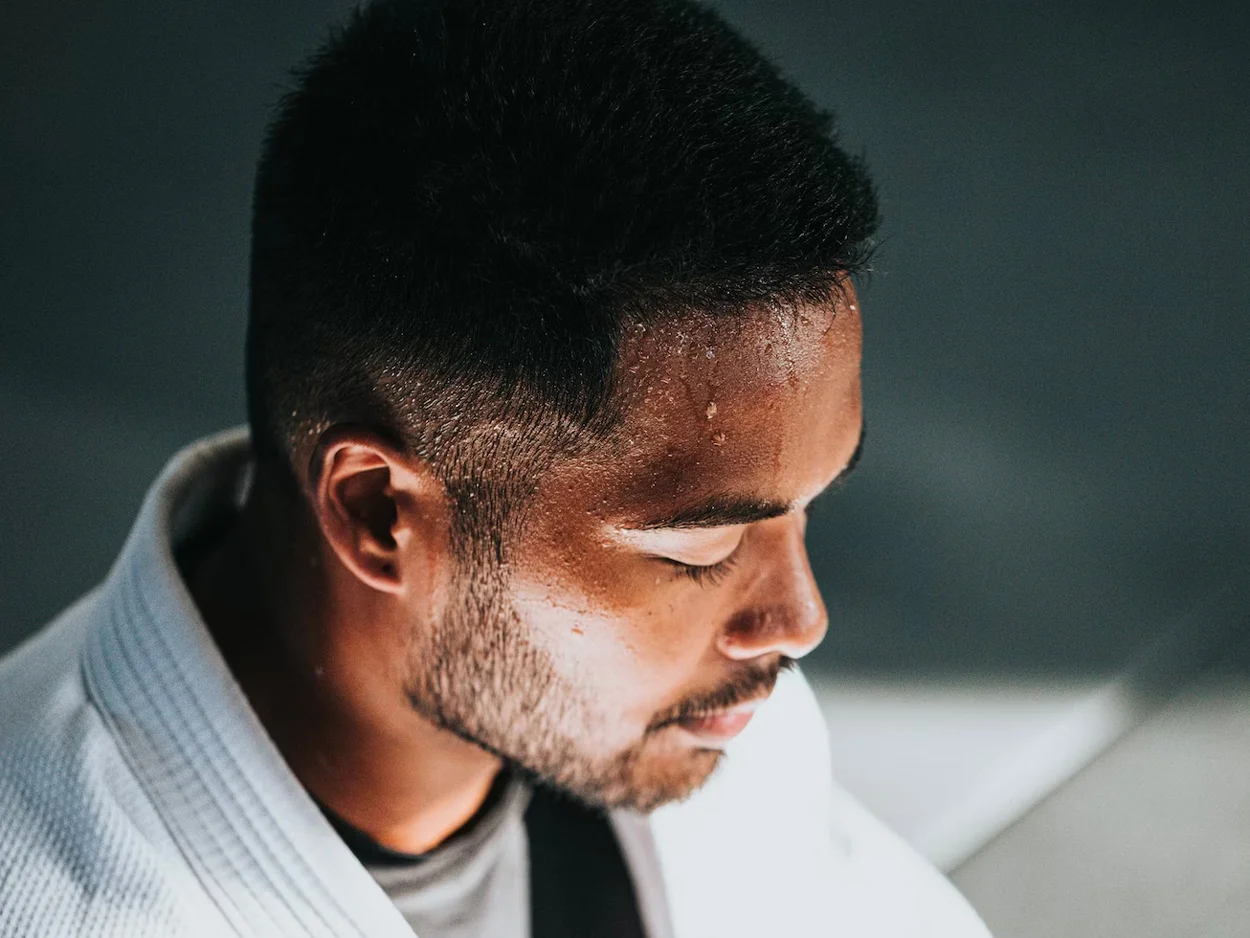Oh, the joys of sweating! We’ve all been there, whether it’s after an intense workout, during a heatwave, or just because of plain old stress. While we know that sweating is a natural process our bodies go through to regulate temperature and keep us cool, you might be wondering if there’s a hidden downside.
How Sweat Can Contribute To Thinner Hair
To better understand the connection between sweating and hair loss, let’s dig a little deeper into the biology of sweating. Our bodies have two types of sweat glands: eccrine and apocrine. Eccrine glands are found all over the body and secrete a watery sweat that helps regulate body temperature. Apocrine glands, on the other hand, are located in areas with high hair follicle density, like the scalp, and produce a thicker, oilier sweat.
When we exercise or feel stressed, our bodies produce more sweat. As a result, our scalps can become a bit of a sweaty mess, especially if we’re dealing with high humidity or poor air circulation.
Sweat, Oil, and Dirt: A Tricky Trio
The combination of sweat, oil, and dirt on your scalp can create an environment that’s not exactly hair-friendly. When these substances mix together, they form a thick layer that clogs hair follicles, making it difficult for new hair to grow and potentially leading to hair loss over time. Moreover, this buildup can create an imbalance in the scalp’s natural microbiome, which can further exacerbate the problem by promoting the growth of harmful bacteria and fungi.
Imbalanced pH
Maintaining a healthy pH balance on your scalp is essential for overall hair health. An imbalance in pH levels can lead to an overgrowth of bacteria and fungi, causing various scalp issues such as dandruff, itchiness, and irritation. Excessive sweating can disrupt the natural pH balance of the scalp, making it more prone to these issues and potentially contributing to hair loss.
Inflammation and Infection
Another aspect to consider is that excessive sweat and the buildup of oil and dirt can lead to inflammation and even infection of the hair follicles. Inflammation can weaken the hair follicle, causing the hair to become more brittle and prone to breakage. Infections, such as folliculitis, can also cause hair loss by damaging the hair follicles. Folliculitis is an inflammation of the hair follicles caused by bacterial, fungal, or viral infections.
Porosity and Hair Health
Hair porosity, or the hair’s ability to absorb and retain moisture, can also play a role in how sweat affects hair health. Low porosity hair is less prone to absorbing moisture, which can cause sweat to accumulate on the scalp, leading to the issues mentioned earlier. Conversely, high porosity hair can absorb sweat more readily, potentially leading to dryness and brittleness if not properly moisturized.
Sweat-Induced Friction
Another factor to consider is the role of friction in hair loss. When we exercise or engage in physical activities, our hair is exposed to friction from the constant movement and rubbing against clothing, accessories, and even our own skin. This friction, combined with the presence of sweat, can cause hair breakage and contribute to hair loss over time.
The Effects of Traction
Tight hairstyles, such as ponytails or braids, can increase the effects of friction and sweat-induced hair loss. These hairstyles put extra tension on the hair follicles, making them more susceptible to damage and breakage. It’s essential to give your hair a break from tight hairstyles and opt for looser, more comfortable styles, especially during physical activities or when you’re prone to sweating.
Do Most People Need To Be Worried?
The good news is that most people don’t need to be overly worried about sweat-related hair loss or hair fall. As mentioned earlier, sweating is a natural process that helps regulate body temperature and detoxify the skin. Occasional sweat buildup on the scalp is generally not a cause for concern, and normal hair fall is a part of the hair growth cycle.
However, if you notice an increase in hair shedding, thinning hair, or any scalp issues such as itching, redness, or inflammation, it’s essential to address these concerns promptly. In some cases, excessive sweating or the buildup of sweat, oil, and dirt on the scalp can contribute to hair loss or exacerbate pre-existing hair and scalp conditions.
Keep in mind that each person’s hair and scalp are different, and factors like genetics, lifestyle, and hair care habits can influence your hair’s overall health. To maintain a healthy scalp and minimize the risk of sweat-related hair issues, it’s essential to practice good hair hygiene, choose appropriate hair products, and protect your hair from excessive friction during physical activities.
The Difference Between Hair Loss & Hair Fall
Before we dive into how to deal with sweat-related hair issues, let’s clear up a common misconception: the difference between hair loss and hair fall. Although these terms are often used interchangeably, they actually refer to distinct phenomena.
Hair Fall
Hair fall is a natural part of the hair growth cycle. On average, we lose around 50 to 100 strands of hair per day, which is perfectly normal. This shedding occurs because each hair follicle goes through a growth cycle that includes a growth phase (anagen), a transitional phase (catagen), and a resting phase (telogen). When a hair strand reaches the end of its telogen phase, it sheds, making way for new hair to grow.
Hair Loss
Hair loss, on the other hand, occurs when hair strands fall out at a higher rate than they can grow back or when the hair growth cycle is disrupted. This can lead to thinning hair or even bald patches. Hair loss can be caused by various factors, such as genetics, hormonal imbalances, nutritional deficiencies, or scalp conditions, among others.
When it comes to sweating and its relationship with hair health, the primary concern is whether it contributes to hair loss rather than just normal hair fall. As discussed earlier, excessive sweating and the buildup of oil, dirt, and sweat on the scalp can potentially create conditions that lead to hair loss. However, it’s essential to keep in mind that not all hair shedding is indicative of an underlying problem, and it’s crucial to distinguish between normal hair fall and hair loss caused by external factors.
How To Prevent Sweat-Related Hair Loss/Fall
If you’re convinced that you’re suffering from sweat-related hair loss, here are some tips and tricks that can help:
1. Keep It Clean
One of the best ways to prevent sweat-related hair problems is to maintain a clean scalp. Regularly washing your hair with a gentle shampoo can help remove sweat, oil, and dirt buildup, reducing the risk of clogged hair follicles and hair loss. However, be careful not to over-wash, as this can strip your hair of its natural oils, leading to dryness and breakage.
2. Dry Shampoo to the Rescue
If you’re pressed for time or can’t wash your hair after a workout, dry shampoo can be a lifesaver. It helps absorb excess oil and sweat, keeping your scalp feeling fresh and clean. Just make sure to use it sparingly and not as a substitute for regular hair washing.
3. Stay Hydrated
Drinking plenty of water is not only essential for your overall health but also for your hair. Staying hydrated helps maintain a healthy scalp and can even reduce excessive sweating. So, don’t forget to drink up!
4. Choose the Right Hair Products
Select hair products that are specifically designed for your hair type and scalp condition. Look for lightweight, non-comedogenic products that won’t clog your hair follicles. If you have a particularly oily scalp or are prone to sweating, consider using a clarifying shampoo once a week to deep-clean your scalp and remove buildup.
5. Protect Your Hair
When working out or engaging in physical activities, wear a moisture-wicking headband or a breathable cap to help absorb sweat and minimize friction. Additionally, avoid tight hairstyles that can cause stress on your hair follicles, and opt for loose, comfortable styles instead.
6. Scalp Care is Self-Care
Don’t forget to give your scalp some TLC! Regularly exfoliating your scalp with a gentle scrub or brush can help remove dead skin cells and prevent the buildup of sweat, oil, and dirt. You can also indulge in a soothing scalp massage to increase blood circulation and promote healthy hair growth.
Is The Hair Loss Permanent?
The permanency of hair loss due to sweating and related factors largely depends on the underlying cause and the extent of damage to the hair follicles. In most cases, hair loss caused by sweat-related issues can be reversible if the problem is addressed promptly and appropriate measures are taken to improve hair and scalp health.
Temporary Hair Loss
In situations where hair loss is caused by clogged hair follicles, inflammation, or friction, the hair is likely to grow back once the issue has been resolved. Maintaining a clean scalp, using appropriate hair products, and protecting your hair from friction can help promote healthy hair regrowth.
Infections and Hair Loss
In the case of scalp infections like folliculitis, hair loss can be reversed if the infection is treated effectively and in a timely manner. If left untreated, however, severe infections can lead to permanent damage to the hair follicles, resulting in permanent hair loss in the affected areas.
Genetic Factors
It’s important to note that if hair loss is primarily due to genetic factors, such as male or female pattern baldness, the hair loss is usually permanent. In these cases, sweat-related factors might exacerbate the hair loss, but addressing the sweat issues alone may not result in hair regrowth. Treatment options for genetic hair loss include medications, topical solutions, or hair restoration procedures, which should be discussed with a healthcare professional or dermatologist.
Conclusion
Sweating is a natural process that helps regulate body temperature and detoxify the skin. While it’s generally not a cause for concern, excessive sweating and the buildup of sweat, oil, and dirt on the scalp can potentially lead to hair loss or hair fall. The impact of sweat on hair health varies depending on factors such as hair texture, scalp condition, and hair care habits.
Most people don’t need to be overly worried about sweat-related hair loss, as maintaining a clean scalp, using appropriate hair products, and protecting the hair from friction can help prevent hair issues. In cases where hair loss occurs due to sweat-related factors, it is often temporary and reversible if the underlying cause is addressed.
In conclusion, being aware of the potential impact of sweat on hair health and taking appropriate measures to care for your hair and scalp can help you maintain a healthy mane, even as you break a sweat.Sweating the details, so your hair doesn’t have to.

